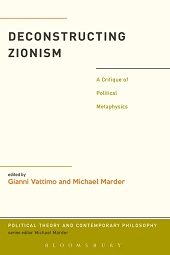What is one to make of a volume of specialised essays in contemporary philosophy – a compilation including some of today’s most prominent leaders in the field – that wants to be both a highbrow offering of intellectually sophisticated, refined, radical-chicbons mots concerning the fate of Being itself, and, at the same time, a worldly-wise and street-smart hail of rhetorical stones pitched at the Jewish state; a kind of theoretical quenelle proffered in Israel’s direction? While the meaning of ‘Being’ (capital B) is notoriously difficult for philosophers to define, it generally means something like the way things hang together as a whole – and the remarkable thing about this book is that the answer is purported to have everything to do with Israel. But for the little Zionist entity alluded to (though not named) in the volume’s title, the contributors collectively meditate that ‘Being’ (that Whole of existence which is greater than the sum of its parts) would be far better off. An odd burden for an embattled nation of around eight million citizens to bear, you say? Then who would insist on such a grandiose, all-purpose condemnation of the Jewish state, and why?
The solution to the enigma of Being’s own anti-Zionism is that this volume emanates not so much directly from the Source of all Meaning and Sense itself – but rather is mediated by certain beings in particular, the kind of privileged academic ‘theorists’ who are at present coming to represent a growing tide of anti-Israel sentiment on college campuses. As such, Deconstructing Zionism is an example of the emerging philosophy of the BDS (Boycotts, Divestments and Sanctions) movement against Israel. It has all the intellectual and moral weaknesses of the temporarily fashionable cause it is written in solidarity with.
‘Being’ and Nothing Constructive to Offer: the ‘Philosophy’ Behind BDS
In this light, what to say about a book that presents itself as not only (i) a metaphysically ‘branded’ (as in brand-name) theoretical all-purpose antidote to the ‘ideology’ of Zionism (the latter taken as a mental pathology to be cured by means of the correct application of ‘deconstructive’ criticism to Israeli identity), but also (ii) a practical assault on the very legitimacy of the actually-existing Jewish state (prosecuted by means of repeated calls to dismantle a UN member-state, and one with high ratings from Freedom House, to boot). It’s troubling. For, paradoxically, the least knowledgeable and (where peace is concerned) most unhelpful political ideas concerning the Israeli-Palestinian conflict are here, in this ostensibly respectable scholarly compendium, conjoined with the most delicate and refined notions concerning nearly everything else – in a blend of cloistered profundity and political childishness reminiscent of the German nationalist philosopher, Martin Heidegger, whose influence looms large over the book’s pages.
Understanding what’s wrong with such a muddled product of academic activism,in other words, is first of all a matter of knowing how to reckon a volume at once so ostentatiously elevated in its aspiration to track the traces of the Logos (or ‘Western reason’) from the beginning of time to the ‘end of (European) History’ (this may be said to constitute the ‘deconstructing’ part of the book), and yet at the same time so pedestrian, simplistic, and naive, concerning the actual stakes of politics in the Middle East today (the aspect aimed at ‘Zionism’ per se). Grasping the import of this dichotomy (or collusion?) between highbrow post-Marxist fantasy at the level of philosophy and lowbrow anti-Israelism at the level of the street (suggested first of all by the book’s jarring title), means recognising a kind of ‘split-personality’ all too typical of far-left intellectuals today – manifested as a contradiction, in the present work’s own Heideggerian terms, between ‘Being and beings,’ or abstract/totalising and concrete/piecemeal visions of justice. Dealing with this ‘bait and switch’ – apparent intellectual rigour standing in for reckless political irresponsibility – will be a task of crucial importance, at least for as long as the voices of real, living human beings are still audible against the background noise of ‘Being’, as Deconstructing Zionism’s useful idiots claim to discern it. For what they hear ‘It’ saying will surprise you!
Listen to this: We have here a set of reflections – aptly dedicated to the late French master-thinker, Jacques Derrida, ‘confounding father’ of Deconstructionism as a movement – that aims to participate in a rejection of something called the ‘metaphysics of presence’ in general, or a transcendence of common sense to be achieved by directing scepticism toward any and all stable identity claims. Common sense (aka ‘logocentrism’) will be overcome, in this case, however – since you’ve got to start somewhere – by rejecting not all identities all at once, but denying specifically Jewish claims to a particularnational identity and its right to a ‘presence’ in part of the territory of the former Ottoman and British Empires that has been fought over for some time. The result of the confluence of these twinned impulses in tension – competing drives toward philosophical comprehensiveness and political specificity that don’t easily fit together here – is that the authors are driven to doubt not only Israel’s right to exist but also the value of any notion of ‘gathering’ whatsoever. It seems like a long way to go in order to say ‘Jews, get out!’ but they’re willing. ‘Gathering’ is henceforth verboten.
By contrast, the idea of ‘Diaspora’ – binary opposite of ‘gathering’ – is taken as a privileged category and existential ur-condition. Here is a genuinely ‘progressive’ way of being that Jews really ought to embrace once again as their birthright, in order to reclaim the (moral) privilege of embodying what it is to be underprivileged with regards to statehood in a world of unjust states. Of course, in so doing, they would deprive the Palestinians of this same moral ‘privilege’ – that of learning to be at home with homelessness – but this seems not to bother the philosophers, who lavish their ethical concern upon Israeli Jews exclusively. While every identity is a questionable mirage or an ‘effect of difference’ (according to Deconstructionism, a philosophy that favours relations of ‘difference’ as ‘more primordial’ than any/all stable/static identities), some identities (‘effects of difference’) are, it seems, more questionable (less deserving of recognition) than others. Clearly, for the authors of Deconstructing Zionism, there is something about Jewish national identity that rankles – and begs for the healing ethical balm of Deconstruction – more than the rest.
Zombie Theory: A Genealogy of Post-Left Mores, from ‘Undecidability’ to Unwarranted Decision
To recall where this stuff comes from. The idea of Deconstruction, as we once thought we knew it, was Derrida’s brainchild – an offbeat approach to thinking about nearly everything as in some sense a kind of hopelessly indecipherable ‘text’, a method of ‘reading’ arrived at by way of Heidegger’s ‘existentialist’ philosophy crossed with an early form of ‘structuralist linguistics’ discovered by the famous Swiss linguist, Ferdinand De Saussure. The practice of ‘deconstructive criticism’, thus spawned, was rapidly adopted by what was then called the ‘Yale School’ of literary criticism – led throughout the 1970s by Derrida’s friend, the mysterious Paul de Man, whose anti-Semitic wartime writings provoked a scandal when they were discovered, in 1983, shortly after his death. Moreover, the whole point of Deconstruction (if something so perplexingly illusive and hyper-sophisticated can be said to have had anything so mundane and bourgeois as a point) was assumed to be the painstaking cultivation of ambiguity anywhere and everywhere, even/especially where none existed (as with the youthful De Man’s patently anti-Semitic views on the worthlessness of Jewish writers, for example, which Derrida shamefully sought to excuse). These were chief among its hallmarks, one was given to assume: the teasing out of dialogue in what only sounded like monologue, until one had listened closely enough; the resolute facing up to endless, irresolvable contradictions embedded at the heart of obvious statements; the recovery of resistance and discovery of dissent from within apparent consensus, and what only looked like quiescence until you examined it with an intrepid eye for aporia. In short, Deconstruction and equivocation went hand in hand, it seemed! No? ‘Undecidability’ (tellingly, one of Deconstruction’s trademark terms) in matters of interpretation was its distinguishing feature, if not its very raison d’etre. Or so – I could have sworn – they said.
Alas, no more. For times have changed. And elements of the ‘left’ just aren’t what they used to be.
Far-left radicalism it had seemed – in those days before 1989 and the collapse of Communism in Europe – was content for a time with sowing confusion, and thereby, if nothing else, possibly helping to expand the range of conceivable interpretations of any situation, text, or social problem. A salutary enough way to kill some time, perhaps, in the name of unfettered imagination. It couldn’t hurt. Why not be open minded? But then, after 11 September 2001, playful uncertainty about true and false, right and wrong, just and just, and where to draw the line between politics and murder – all this was no longer taken quite so playfully.
Yet to admit defeat under such circumstances was intolerable for the hardcore haters of the West residing in the academy there. And so, rather than accept the chastening lessons of anti-totalitarianism as revealed by history, in a palpably changed world faced with a new fascist threat, what came to be seen (by its critics) as a new ‘post-left’ paradigm defiantly emerged. It was exemplified by the morbid residue of an embittered (no longer) ‘progressive’ radicalism that, while retaining an affinity for some things postmodern and nearly all things ‘postcolonial’ (including Deconstructionist theory), added a novel strand of sympathy for illiberal anti-modern (fascist) Islamist radicalism to the mix of its confused ideology – as many have documented, most notably Matthias Küntzel in Germany; Paul Berman, Jeffery Herf, and (most volubly in terms of media exposure) the late lamented Christopher Hitchens in the US; Pascal Bruckner, Bernard-Henri Lévy and others in France; the philosopher, Bernard Harrison, in Britain, along with, most influentially, the formidable journalist Nick Cohen, the independent-minded political theorist Alan Johnson, and the rest of the Euston Manifesto group led by the late (and sorely missed) Norman Geras. Moreover, while the likes of Judith Butler (included in the volume under review here) were declaring from Berkeley that Hamas and Hezbollah were a part of the ‘global left’, the Somali-born Ayaan Hirsi Ali knew better – and warned us all at the risk of her life.
So, a strange odyssey, indeed. Yet it has come to pass that now, in 2013/14, in apparent frustration with their own impotence, the post-left authors and editors of Deconstructing Zionism – representatives of a despairing former left, in league now openly and unabashedly with outright fascist/far-right anti-Semitism – have tired of endless temporising and chosen instead precisely the contrary strategy to that which Deconstruction had once made fashionable. Though they retain the rubric of ‘Deconstruction’, these entrepreneurs of the term, as they now employ it, favour not doubt – much less aporia – with regards to the grounds of their conclusions, but opt for oversimplification and overconfidence to the point of unequivocal, near univocal agreement on what is in fact an exemplary instance of manifest conflict between different narratives, or contrary warring viewpoints. If ever there was anything ‘undecidable’ one might have thought the ongoing Arab-Israeli Hundred Years War a candidate! Yet, far from seeing anything overly complicated or difficult to determine about coming out for the dismantling of one side in that conflict (the Jewish state), the authors simply assume that their favoured ‘bi-national one-state solution’ – because they find it philosophically appealing – is viable and ‘just’, suitable in fact not only for bringing peace between Arab and Jewish beings at odds with one another,but, above and beyond that, sufficient to rescue Being (a nebulous term for how things as a whole appear to fit together) in the process.
While such overblown rhetoric may sound tempting to dismiss – it would be wrong to take it too lightly. This kind of ‘thought’ is all-too-prevalent in American, European, and even (to some extent) Israeli academia today. In fact, it is a significant part of the concerted BDS campaign. Along with the documented ‘resurgence’ of anti-Semitism in recent decades, there has also arisen a more subtle and harder to track upsurge of a refined theoretical anti-Zionism with roots in anti-Semitism and German nationalist ontology. With the code-words it provides for cover, prominent intellectuals without any particular qualifications germane to the question of Israel/Palestine lend a measure of respectability to a nefarious effort at stigmatisation, marginalisation and delegitimisation of the Jewish state. On ‘ontological’ grounds, of course.
Archaeology of Anti-Zionism: From the Philosophical ‘Deconstruction’ of Western Metaphysics to the Political ‘Destruction’ of Democracy in the Middle East
For, make no mistake, this is not about mere fancy philosophical footwork for its own sake. It is the concrete and physical destruction of actually-existing Zionism’s real product, Israel, defined as a Jewish and democratic state – and not only the mental game of ‘Deconstruction’, or any other sort of merely academic exercise involving the ‘discursive construct’ of an imaginary Zionism, taken as some kind of ‘text’ to be worried over – toward which this work of post-left post-critical theory relentlessly labours. As the editors candidly announce,
‘Far from purely academic exercises, [such brave intellectual forays as these] are practical and political interventions, responding to the singular demands of justice’ [emphasis added; xii].
Not only that (!) but, going further in this same vein, Marc H. Ellis, in his essay, ‘The Prophetic Instability of Zionism’, unflinchingly contemplates some of the uglier practicalities associated with this particular vision of ‘justice’ – when that word has been reduced to a synonym for wiping a recognised, prosperous, free and liberal-democratic nation-state from the map. Candidly acknowledging that the short-term consequences of such an eliminationist programme might not look too pretty, Ellis grits his teeth (or grins?) and tells us that painful necessities must be endured resolutely:
‘At least in the present, [Ellis is willing to accept that] the very announcement of a process of ending a Jewish State of Israel would probably precipitate a mass exodus of Jewish Israelis to Europe and the United States – if, that is, the borders of the various states would accept millions of Jewish Israelis’ [emphasis added; 108].
And if not? He doesn’t say. So let’s not ask.
Instead, committed to ‘justice’ [sic], Ellis enjoins his readers to ‘think about the end of the Jewish state’. Such ‘thinking’, he promises, can help in ‘hollowing out the Jewish claim to Palestinian land’ [sic], so that one day ‘Jews will embark with Palestinians in creating an Israel/Palestine where both live together in equality and peace’ (109). That is, of course, if there has not already been a ‘mass exodus of Jewish Israelis’ to Europe or … Madagascar? Nor does he suggest what, if anything, the Palestinians might want to ‘think about’ for this utopia of the new Israel-Palestine to come about. Maybe, as a start, they could think about an end to threatening the massacre – as the Hamas Charter promises – of all the ‘sons of apes and pigs’ from the river to the sea? Or, they could think about fully recognising Israel’s right to exist? But, no: for that, you see, would not be ‘justice’.
Hear this, too: neither Ellis nor anyone else in this volume has so much as a negative word for the Palestinians. Rather, as the neo-Leninist thinker, Slavoj Žižek, recommends, in his essay, ‘Anti-Semitism and Its Transformations’, the important thing is to keep insisting on the validity of traditional Palestinian rejectionism, spiced up with a Parisian radical twist: ‘in the Israeli-Palestine conflict […] soyons realists, demandons l’impossible!’ (be realistic, demand the impossible), he glibly advises (9). In other words, for the authors ofDeconstructing Zionism, it is still May ‘68 and the students are still on the barricades. Only now it’s all about Israel. We are to ‘demand’ (and is that really how politics works?) an impossible fantasy of Arab-Jewish bi-nationalism, incorporating Gaza, the West Bank, and Israel into a greater Palestine, even though such a policy prescription has no meaningful constituency (and never has had).
According to Žižek, ‘the cliché of the Gaza Strip as “the greatest concentration camp in the world” […] has become dangerously close to the truth’ (8). And, given the evidently near Nazi-like character of any state that could condone this, as the abhorrent word-play implies – is it not, in this light, perfectly clear that the true anti-Semites of today are the Zionists themselves? After all, it is the Jewish nationalists themselves, suggests Žižek (in the worst thing he has ever written), who at this point are the real bad guys for attacking mercilessly their fellow Jews around the world for not supporting Israel sufficiently. The Israeli ‘Zionist anti-Semite’ [sic] thus comes into being as the one who guiltily ‘constructed the figure of the Jew who doubts the Zionist project along anti-Semitic lines.’ Put another way, Žižek thinks that the anti-Semitic gesture of questioning the loyalty of Jews – once so hideously directed at the insufficiently assimilated Jews of Europe – now emanates directly from those intolerant Israeli ‘Jewish anti-Semites’, who doubt the loyalty of Israel’s Jewish critics in a way analogous to the Dreyfus Affair (3, 6). As Žižek avers (or pretends to believe for the sake of laughs: it’s not always easy to tell with him), Israel’s defenders now habitually criticise too harshly those fellow Jews who are committed to living in Diaspora (outside Israel’s borders, or without it altogether) as traitors to the Jewish state. A far-fetched claim, indeed (if not a merely playful one), so full of offensive contradictions that I put it aside here for lack of space (and patience, I have to admit). Rather than respond directly to such high-theoretical ad hominems, let’s just leave that epithet where we found it, in the gutter – and instead look to see where the post-postmodern anti-Zionist theorist of today finds his/her own solace and hope for the future (since criticising anti-Zionists is for them a no-no).
In Praise of Diaspora: Reconstructing Anti-Semitism
Eschewing critical reflection on their committed anti-Zionism as inherently suspect (à la Žižek), the authors of this volume would have us listen instead to … the former Iranian president, Mahmoud Ahmadinejad! Yes, that’s right. As a prominent Italian philosopher (and member of the European Parliament), Gianni Vattimo, sees it (N.B., these are leading figures in the world of academic research we are talking about), Ahmadinejad was onto something. In ‘How to Become an Anti-Zionist’, an essay which might have been more accurately titled ‘How Gianni Vattimo has Earned the Right to Be Known as one of the Most Prominent Anti-Semites in the Academy Today’, Vattimo (author of so many illuminating books throughout the 1980s and 1990s) writes something that can hardly be believed (I rub my eyes, but still there are the words on the page when I open them again!):
‘For good reasons of international stability, one never dares – or almost never, except in the case of Islamic heads of state like Ahmadinejad – to question the very legitimacy of Israel’s existence … When Ahmadinejad invokes the end of the State of Israel, he merely expresses a demand that should be more explicitly shared by the democratic countries that instead consider him an enemy’ [emphasis added; 19].
With this as what now passes for ‘deconstructing Zionism’ in some – too many – universities, do we really need to bother reconstructing it? If Ahmadinejad is our intellectual rival, in other words, then perhaps, after all, this is less of anintellectual test per se than all the highfalutin verbiage about ‘Being’ would have had one assume.
Sadly, the book’s contributors themselves are hardly obscure ‘nobodies’ whom one can simply ignore, however. It is all the more disturbing that the eleven essayists – including such luminaries of cultural theory as Judith Butler and Luce Irigaray – all follow Vattimo in declaring that the ‘inessential essence’ and ‘non-foundational foundation’ (one almost wants to say the ‘inner greatness’, echoing Heidegger) of both Deconstruction and Judaism rightly perceived is one and the same. The experience of Diaspora, or statelessness, is what makes of both (yes, Deconstruction and Judaism) the quintessential challenge to all stable identities that each is ‘destined’ to be. Because Diaspora is not just benign but salutary in this respect – that of virtuously challenging all settled claims to every ‘territorialised’ identity – it follows that anticipating the ‘end of the State of Israel’, as the authors do, can do no harm in their eyes. Indeed, ‘Zionism Bad, Diaspora Good!’ (with apologies to Orwell) might well be said to be the central claim of the volume.
Thus, as Vattimo’s co-editor Michael Marder writes in ‘The Zionist Synecdoche’ (‘synecdoche’ is the trope of substituting for mention of any whole one of its parts):
‘An avowal of diaspora has been the implicit sine qua non [emphasis added] of Derrida’s deconstruction of Western metaphysics. The argument that the origin is not one, that it is scattered still before a coherent beginning into a multiplicity of origins, has been the hallmark of deconstruction not only in its thinking of difference but also, and more pertinently, in the thought ofdissemination, which is a precise translation of diaspora from the Greek. Conversely, Zionism, of all stripes and varieties, envisions the gathering of the diaspora in the material place of Zion … This policy considers the scatter to be inessential …’ (157).
By contrast, these authors seem to think that what is essential is ‘the scatter’, i.e. the diasporic Jewish experience. And so it is Zionism – not Ahmadinejad, Hamas, or Hezbollah! – that stands in for sedentary Western metaphysics at its worst, and thus stands condemned by association with the West, guilty of all the transgressions that flow from rhetorical and philosophical anti-diasporic ‘anti-Jewishness’. Apparently, when it comes to ‘deconstructing Zionism’, theorie(theory) and terrorie (terrorism) are not so far apart. When Diaspora is the ‘sine qua non’, this comes as no surprise.
The Anti-Semitic Synecdoche: Theorie and Terrorie
And thus it is that these exercises in what might as well be called (in the Derridean spirit of neologism?) ‘t(h)e(o)rro(r)ie’, all work to saddle Israel (the one Jewish state in the world, amidst so many Muslim and predominantly Christian ones), with more responsibility than any single nation-state can possibly bear. Again and again we are told, in effect, ‘it all boils down to’ Israel standing in for what’s wrong with the world in general (synecdoche indeed!). For example, as Santiago Zabala writes, in ‘The Hermeneutical Stance’,
‘In sum, political Zionism does not only represent [the dispossession of the Palestinians], but also the discharge of Being. If Being must remain discharged from the standpoint of Zionist nationalists who can then proceed with their programs of occupation and segregation, then philosophy has the obligation to retrieve its remainders. But why is the Hermeneutical stance suitable for advancing claims in favor of the discharge of Being?’ [emphasis added; 150].
By that portentous phrase, ‘discharge of Being’, one understands, in this context, a wilful failure of memory and imagination – a refusal to see/acknowledge the ‘discontents’ produced out of one’s own civilisational project. A self-inflicted blindness elevated to the level of ‘original sin’. With something like getting oneself ‘discharged’, in turn, from Eden, as a result?
Another troubling metaphor, you say?! I agree! But there it is, I’m afraid – like a snake in the grass. Are we supposed to overlook it – or are we meant to conclude, on the basis of these kinds of sotto voce hints, that Israel is maybe just a little bit Satanic after all, as the related banners displayed at BDS rallies less abashedly hector? Why shouldn’t we draw such a conclusion, I mean, according to a careful parsing of this line of thinking? For if, not only is Israel illegitimate politically vis-à-vis the oldest, most counterproductive and maximalist Palestinian claims, but also the Jewish state has, by the way, committed sins against Being-with-a capital-B, stimulating the ‘discharge’ of the unrepresented from the possibility of representation – what compromise is possible that wouldn’t leave Being wounded and crying out bitterly – why have you forsaken me? What punishment for that well-nigh deicide (Be-icide?) can suffice for the crucifiers of The Source of the Way Things Appear? Which sin is worse, in the eyes of this book’s authors – the tragic displacement of the Palestinians during the fighting of 1948 or the lamentable ‘discharge’ of Being that went with it? Compared to hermeneutics’ task of putting Being back together again (‘retriev[ing] its remainders’: but then that starts to sound a bit like ‘gathering’ after all … not very diasporic!), you would think a two-state solution to the problem of the refugees and their descendants ‘right of return’ (to Palestine) would be relatively easy. However, this book doesn’t care about mere (human) beings. Because its jet-setting authors have their eyes and ears attuned to the sacred, holy, long-suffering stuff of Being: yes, our radical theorists are transfixed by an apocalyptic vision of total redemptive transformation of the Whole. For the sake of which heaven-on-earth the worthless ‘parts’ of this broken, mundane world – the only world we know, after all – can go to hell.
Shorn of parable: A two-state solution to the Israeli-Palestinian conflict is rejected here as contrary to the progressive zeitgeist that demands an end to nations, starting with the Jewish one. As Walter D. Mignolo writes, in ‘Decolonizing the Nation-State’, it all comes down to pulling on the lynchpin, Israel:
‘The bottom line is that, while the State of Israel presupposed the secular European and modern form nation-state, a solution to the conflict Palestine/Israel could hardly be found within the same frame that created the conflict. Simultaneously, the planet is witnessing the politicization of civil society (growing manifestations demanding dignity) and the emergence of global political governance that offer alternatives to the form of the nation-state, which created the conditions for the emergence of Zionism in the modern/colonial world order’ [emphasis added; 72].
Of course, as far as any lasting peace between Israelis and Palestinians goes, this is nothing but a council of despair – another cruel delusion that the book’s contributors share with the currently fashionable BDS movement, which likewise fancifully ‘demands’ an end to the Jewish state as the sine qua non of a totally abstract conception of ‘justice’ bearing no relation to reality. ‘The planet’, we are now informed (much like ‘Being’ and its ‘discharge’) wants it that way.
Not only that. But Israel is, additionally (yes, there’s still more!) held to be a prime example of patriarchy, as well. (Never mind the condition of women in most Muslim countries. Forget that.) And at this point in the litany of absurd accusations, one almost has to start, wearily, to concede: why not? For if Israel already represents the ‘discharge of Being’ and compromises the fate of ‘the planet’ (in terms of an impending transcendence of the nation-state form which, but for Israel, might at last get fully under way), then why not let it stand in too for the sources of gender inequality in the world? As the noted feminist theorist, Luce Irigaray, writes in ‘Sharing Humanity’, there is no good reason that Israelis and Palestinians should not together lead the way toward a utopia beyond masculine aggression:
‘Would current conflicts [in general], [and] in particular the Arab-Israeli conflict, be possible if feminine hospitality would spread into civil life? And does not a world culture require such an evolution?’ [emphasis added; 178)].
Yes, some of that feminine hospitality might go a long way in Gaza, I have to admit. But until that day comes? Sadly, it appears from the likes of such citations as the above, and those above it cited earlier (and others that could have been cited, but for considerations of space and the reader’s endurance), that the purpose of this volume of essays is to insist, in the most abstruse and obfuscatory ways (‘theory’ at its clichéd worst), that the meagre, commonsense goal of moderation and compromise between peoples with conflicting narratives and competing rights to national self-determination is not even worth discussing, let alone struggling for, as the two-state solution is neither possible nor desirable. Indeed, Justice, History, Being, and even Gender Difference have said so. A BDS placard denouncing Israelis as the new ‘Nazis’ could not have drawn the line more emphatically.






































The reality is this: If you are more critical of the “nationalism” of the liberal, democratic, multicultural Israel (a country that wants to live in peace with its neighbors) than the nationalism of its despotic, ethnic cleansing, racially (or religiously) pure neighbors, then you are an anti-Semite. Of all of the disgustingly bigoted, racist, despotic, reactionary countries in the region, Israel should be criticized last. Difficult to take those leftist intellectuals seriously until they deconstruct Muslim supremacism, sectarian violence, Jihad against Jews, the Arab war against Israel, and Islamic imperialism. I’m not holding my breath.